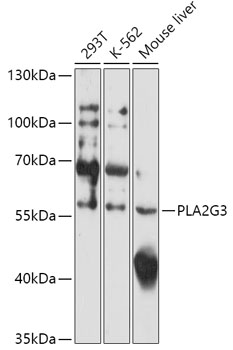Cell Biology Antibodies 13
Anti-PLA2G3 Antibody (CAB17696)
- SKU:
- CAB17696
- Product Type:
- Antibody
- Reactivity:
- Human
- Reactivity:
- Mouse
- Host Species:
- Rabbit
- Isotype:
- IgG
- Antibody Type:
- Polyclonal Antibody
- Research Area:
- Cell Biology
Description
| Antibody Name: | Anti-PLA2G3 Antibody |
| Antibody SKU: | CAB17696 |
| Antibody Size: | 20uL, 50uL, 100uL |
| Application: | WB |
| Reactivity: | Human, Mouse |
| Host Species: | Rabbit |
| Immunogen: | A synthetic peptide of Human PLA2G3. |
| Application: | WB |
| Recommended Dilution: | WB 1:500 - 1:2000 |
| Reactivity: | Human, Mouse |
| Positive Samples: | 293T, K-562, Mouse liver |
| Immunogen: | A synthetic peptide of Human PLA2G3. |
| Purification Method: | Affinity purification |
| Storage Buffer: | Store at -20°C. Avoid freeze / thaw cycles. Buffer: PBS with 0.02% sodium azide, 50% glycerol, pH7.3. |
| Isotype: | IgG |
| Sequence: | Email for sequence |
| Gene ID: | 50487 |
| Uniprot: | Q9NZ20 |
| Cellular Location: | |
| Calculated MW: | |
| Observed MW: | 57kDa |
| Synonyms: | GIII-SPLA2, SPLA2III, sPLA2-III, PLA2G3 |
| Background: | This gene encodes a protein that belongs to the secreted phospholipase A2 family, whose members include the bee venom enzyme. The encoded enzyme functions in lipid metabolism and catalyzes the calcium-dependent hydrolysis of the sn-2 acyl bond of phospholipids to release arachidonic acid and lysophospholipids. This enzyme acts as a negative regulator of ciliogenesis, and may play a role in cancer development by stimulating tumor cell growth and angiogenesis. This gene is associated with oxidative stress, and polymorphisms in this gene are linked to risk for Alzheimer's disease. [provided by RefSeq, Apr 2014] |
| UniProt Protein Function: | PLA2G3: PA2 catalyzes the calcium-dependent hydrolysis of the 2- acyl groups in 3-sn-phosphoglycerides. Shows an 11-fold preference for phosphatidylglycerol over phosphatidylcholine (PC). Preferential cleavage: 1-palmitoyl-2-linoleoyl- phosphatidylethanolamine (PE) > 1-palmitoyl-2-linoleoyl-PC > 1- palmitoyl-2-arachidonoyl-PC > 1-palmitoyl-2-arachidonoyl-PE. Plays a role in ciliogenesis. Belongs to the phospholipase A2 family. |
| UniProt Protein Details: | Protein type:Lipid Metabolism - arachidonic acid; Lipid Metabolism - linoleic acid; Lipid Metabolism - alpha-linolenic acid; Lipid Metabolism - ether lipid; EC 3.1.1.4; Phospholipase; Lipid Metabolism - glycerophospholipid Chromosomal Location of Human Ortholog: 22q12.2 Cellular Component: centriole; extracellular region; extracellular space Molecular Function:calcium-dependent phospholipase A2 activity; phospholipase A2 activity Biological Process: phospholipid metabolic process |
| NCBI Summary: | This gene encodes a protein that belongs to the secreted phospholipase A2 family, whose members include the bee venom enzyme. The encoded enzyme functions in lipid metabolism and catalyzes the calcium-dependent hydrolysis of the sn-2 acyl bond of phospholipids to release arachidonic acid and lysophospholipids. This enzyme acts as a negative regulator of ciliogenesis, and may play a role in cancer development by stimulating tumor cell growth and angiogenesis. This gene is associated with oxidative stress, and polymorphisms in this gene are linked to risk for Alzheimer's disease. [provided by RefSeq, Apr 2014] |
| UniProt Code: | Q9NZ20 |
| NCBI GenInfo Identifier: | 317373314 |
| NCBI Gene ID: | 50487 |
| NCBI Accession: | Q9NZ20.2 |
| UniProt Secondary Accession: | Q9NZ20,O95768, |
| UniProt Related Accession: | Q9NZ20 |
| Molecular Weight: | 57,167 Da |
| NCBI Full Name: | Group 3 secretory phospholipase A2 |
| NCBI Synonym Full Names: | phospholipase A2 group III |
| NCBI Official Symbol: | PLA2G3 |
| NCBI Official Synonym Symbols: | SPLA2III; sPLA2-III; GIII-SPLA2 |
| NCBI Protein Information: | group 3 secretory phospholipase A2 |
| UniProt Protein Name: | Group 3 secretory phospholipase A2 |
| UniProt Synonym Protein Names: | Group III secretory phospholipase A2; GIII sPLA2; sPLA2-III; Phosphatidylcholine 2-acylhydrolase 3 |
| Protein Family: | Group 3 secretory phospholipase |
| UniProt Gene Name: | PLA2G3 |
| UniProt Entry Name: | PA2G3_HUMAN |







